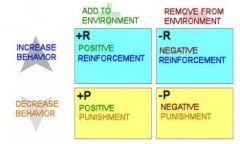![]()
![]()
![]()
Use LEFT and RIGHT arrow keys to navigate between flashcards;
Use UP and DOWN arrow keys to flip the card;
H to show hint;
A reads text to speech;
37 Cards in this Set
- Front
- Back
|
Dualistic Stage |
Right/Wrong |
|
|
Multiplistic Stage |
Different ways to do things that are equal |
|
|
Relativistic Stage |
Everything is relative, but not equal |
|
|
Commitments in Relativism |
Challenge and test accepted truth, make commitments to options that are evaluated as better than others |
|
|
Over Confidence Gap |
Happens in Professionals, think they are pros and then their judgement reaches a peak |
|
|
Dispositional Crisis |
Decision making based crisis |
|
|
Psychiatric Crisis |
Disorder caused crisis |
|
|
Maturational/Developmental Crisis |
Happens w/ age |
|
|
Traumatic Stress |
Makes you question safety/security |
|
|
Psychopathological Crisis |
Bordering an emergency, serious because of disorder |
|
|
Psychiatric Emergency |
BAAADD, caused by disorder, hospital/mental facility level |
|
|
Fixed Interval |
Fixed period of time after each reinforced response |
|
|
Variable Interval |
Unpredictable amount of time varying around some avg, must elapse before next reinforcement |
|
|
Fixed Ratio |
Response has to occur a certain number of fixed times before reinforcement |
|
|
Variable Ratio |
Unpredictable amt of responses occur, usually around an avg, until reinforcer is delivered |
|
|
Reinforcement vs Punishment |

|
|
|
Thorndike's Law of Effect |
Responses that produce good effects will be repeated and responses that produce negative effects will not |
|
|
BF Skinner and Thorndike |
Thorndike= Cat Puzzle Boz
Skinner= Skinner Box(mouse) *coined behaviorism phrase |
|
|
Operant vs Classical |
Operant= Reinforcement-> Behavior
Classical= conditioning a response (conditioned emotional response) |
|
|
Generalization |
Stimuli resembling the CS elicit a CR w/o ever being paired w/ the U.S. |
|
|
Discrimination Training |
Can be used to abolish generalization b/w 2 stimuli |
|
|
Learning Paradigms |
Behaviorism Classical Conditioning Operant Conditioning Observational Learning Ecological Perspective |
|
|
Empathy vs Sympathy |
Empathy- in their shoes Sympathy- Acknowledging another persons hardships |
|
|
ID |
Selfish motives |
|
|
Ego |
Negotiates w/ outside world, yourself |
|
|
Superego |
Nice |
|
|
Enlightenment |
Increased concern for mentally ill |
|
|
Behaviorism |
the theory that human and animal behavior can be explained in terms of conditioning, without appeal to thoughts or feelings, and that psychological disorders are best treated by altering behavior patterns. |
|
|
Self Disclosure |
process of communication through which one person reveals himself or herself to another. It comprises everything an individual chooses to tell the other person about himself or herself, making him or her known. |
|
|
Best Traits for Therapy Clients |
Young Attractive Verbal Intelligent Social
*having social support |
|
|
Paraphrase |
Relaying info in diff wording |
|
|
Non-Verbal Communication |
Eye Contact- Sparingly Body Position- Front and Open Physical Distance Intimacy- Impersonal vs Personal Tone- Warm Posture- Leaning toward the client Touching |
|
|
Extinction |
Eventual decline that ends with no response to C.S. |
|
|
Spontaneous Recovery |
CS returns randomly after extinction |
|
|
Time Periods |
1920-1970 Psychoanalysis vs Behaviorism |
|
|
3 Aspects of Clients Experience |
cognitive |
|
|
Opening Skills |
Door Opener Minimal Encouragers
|

